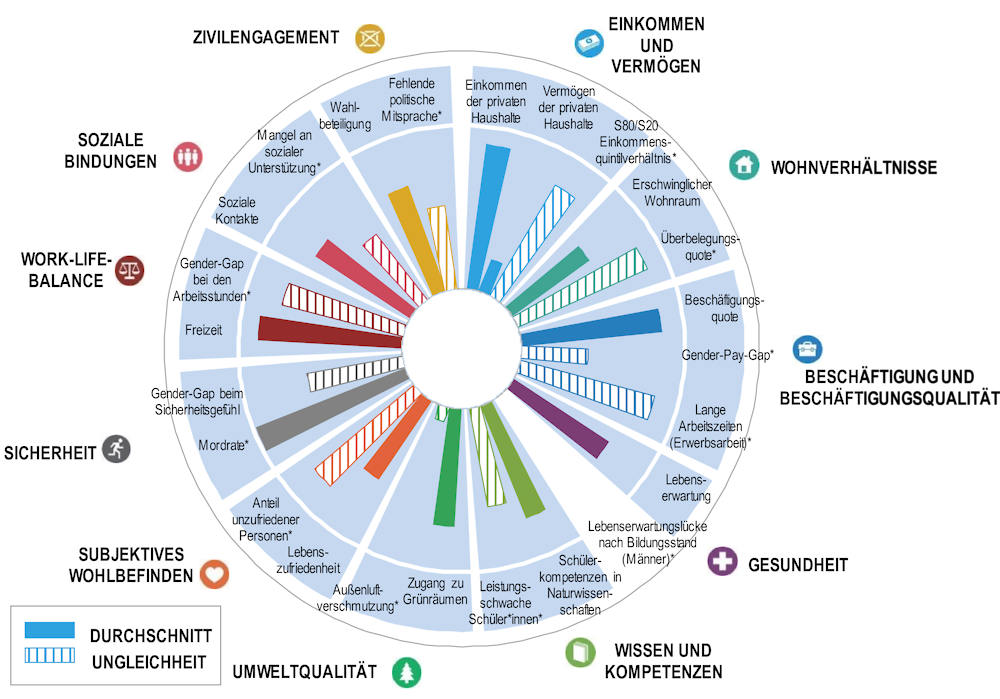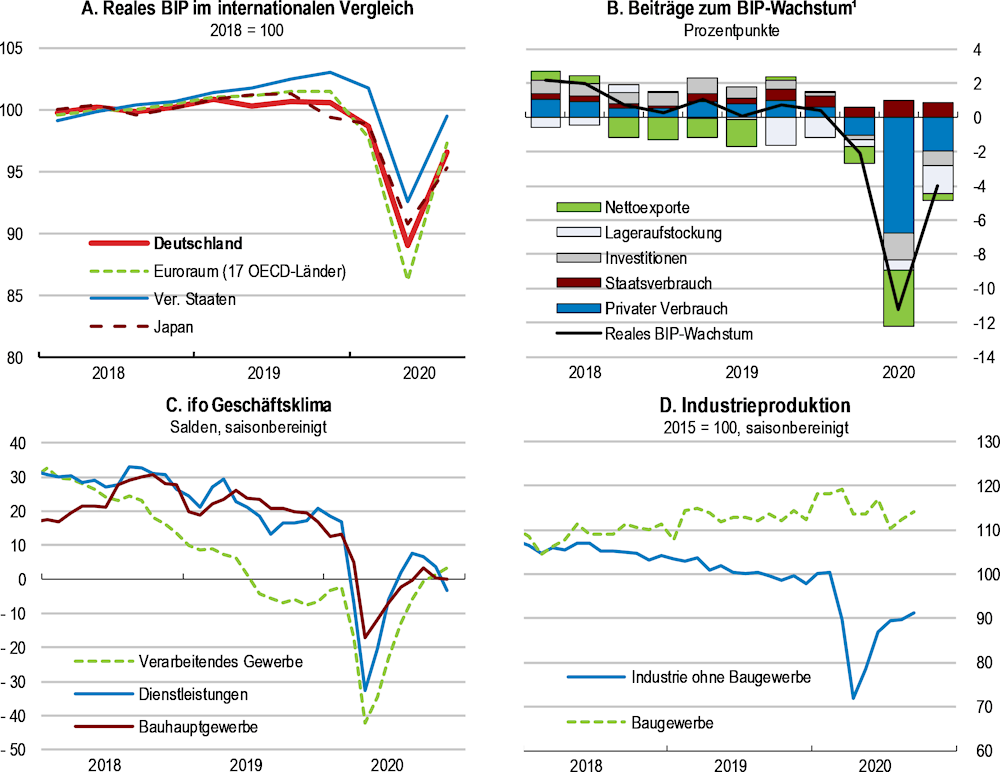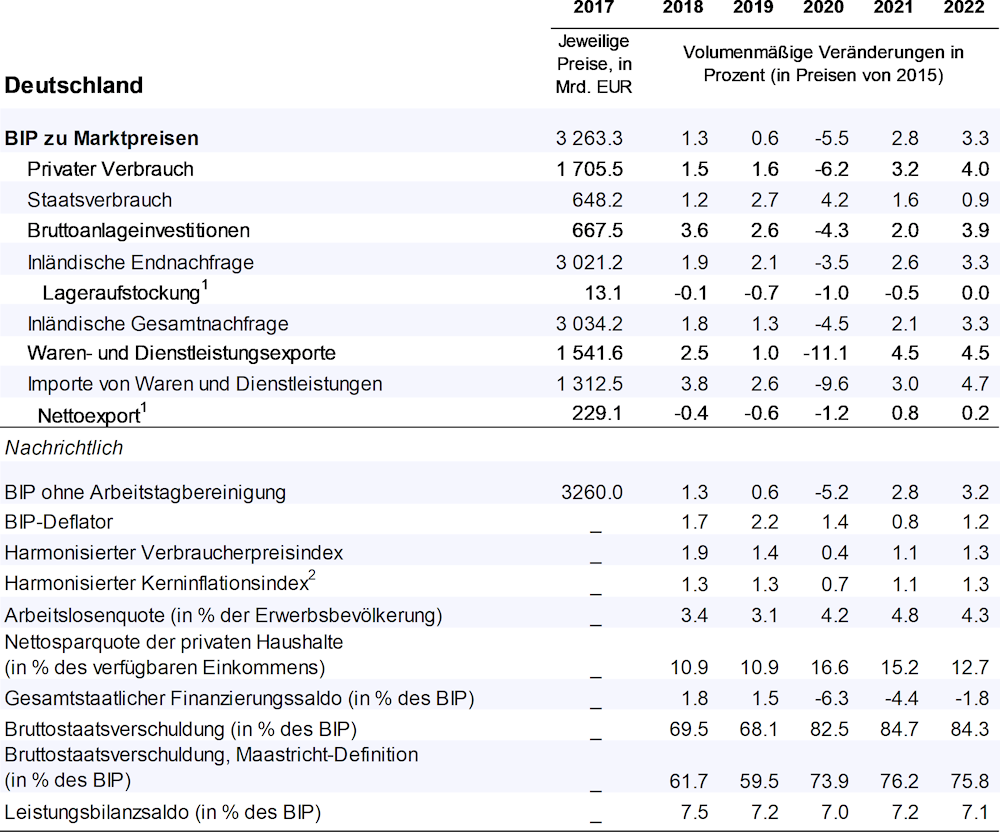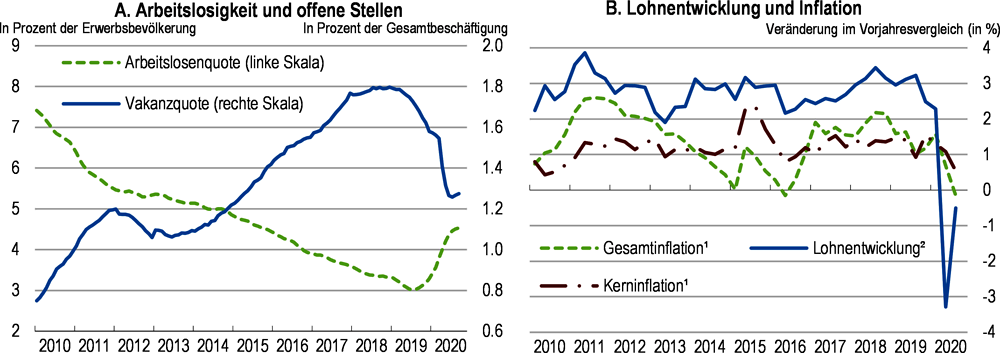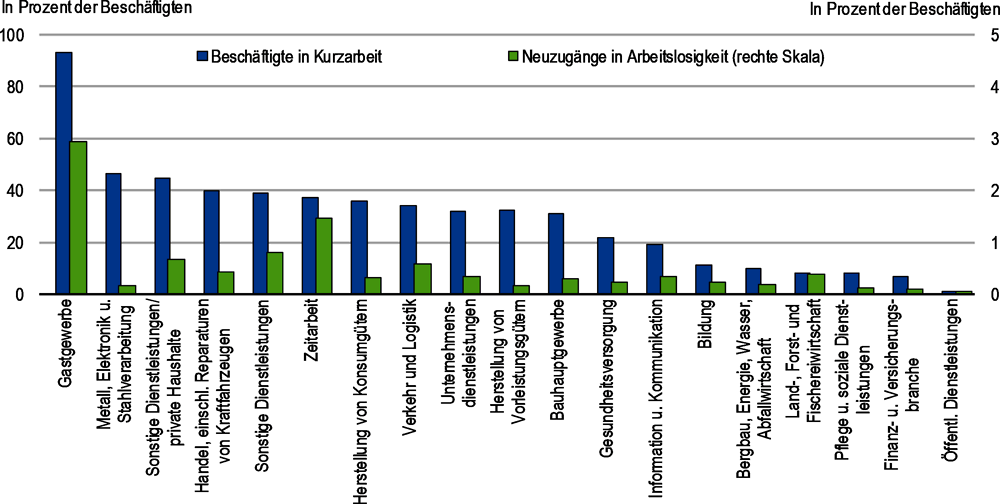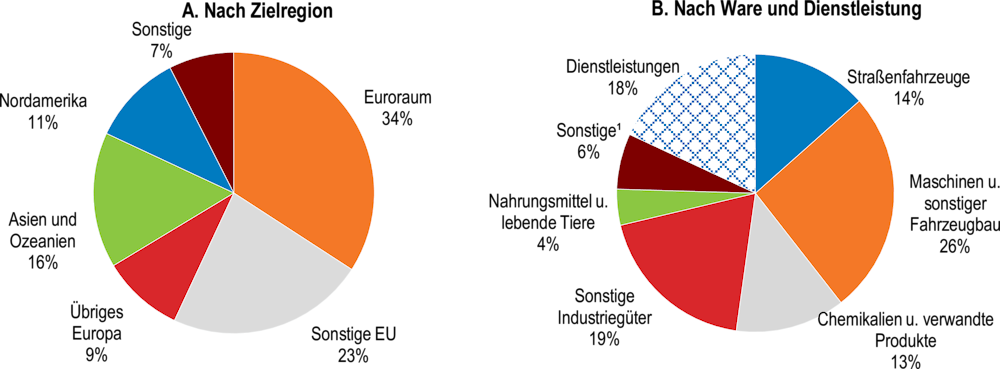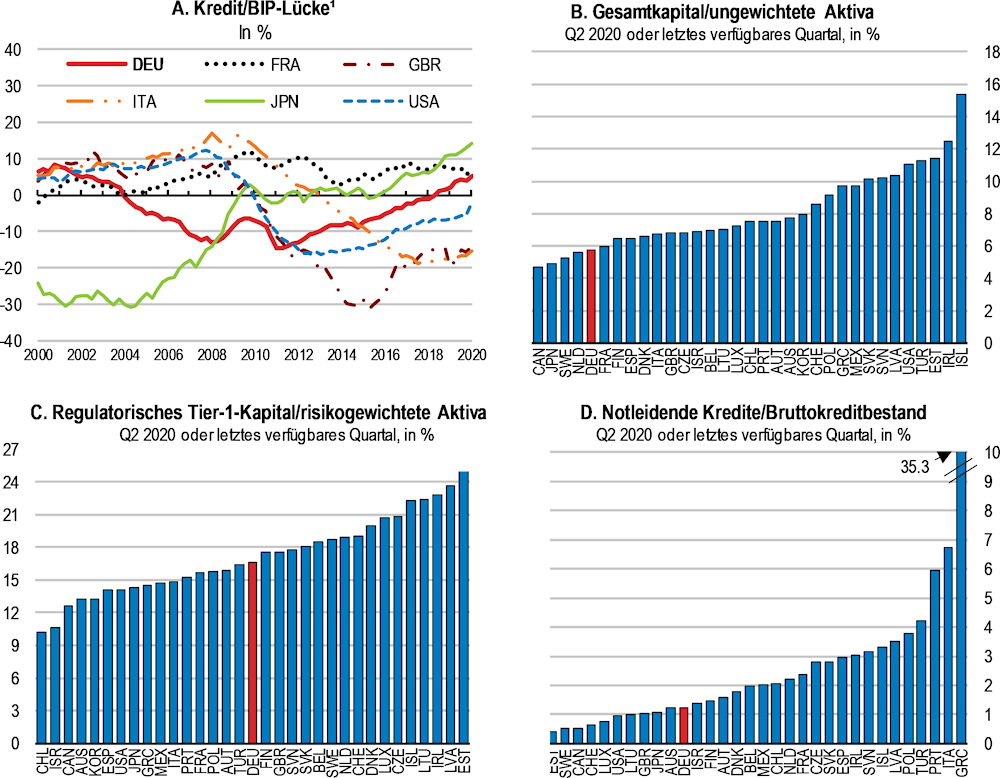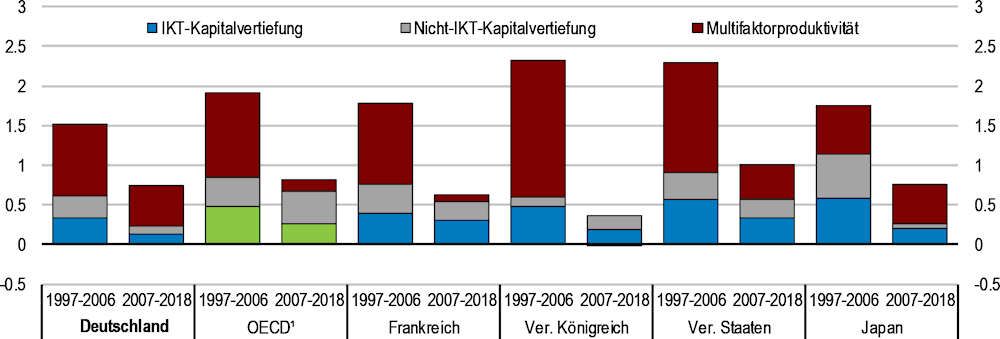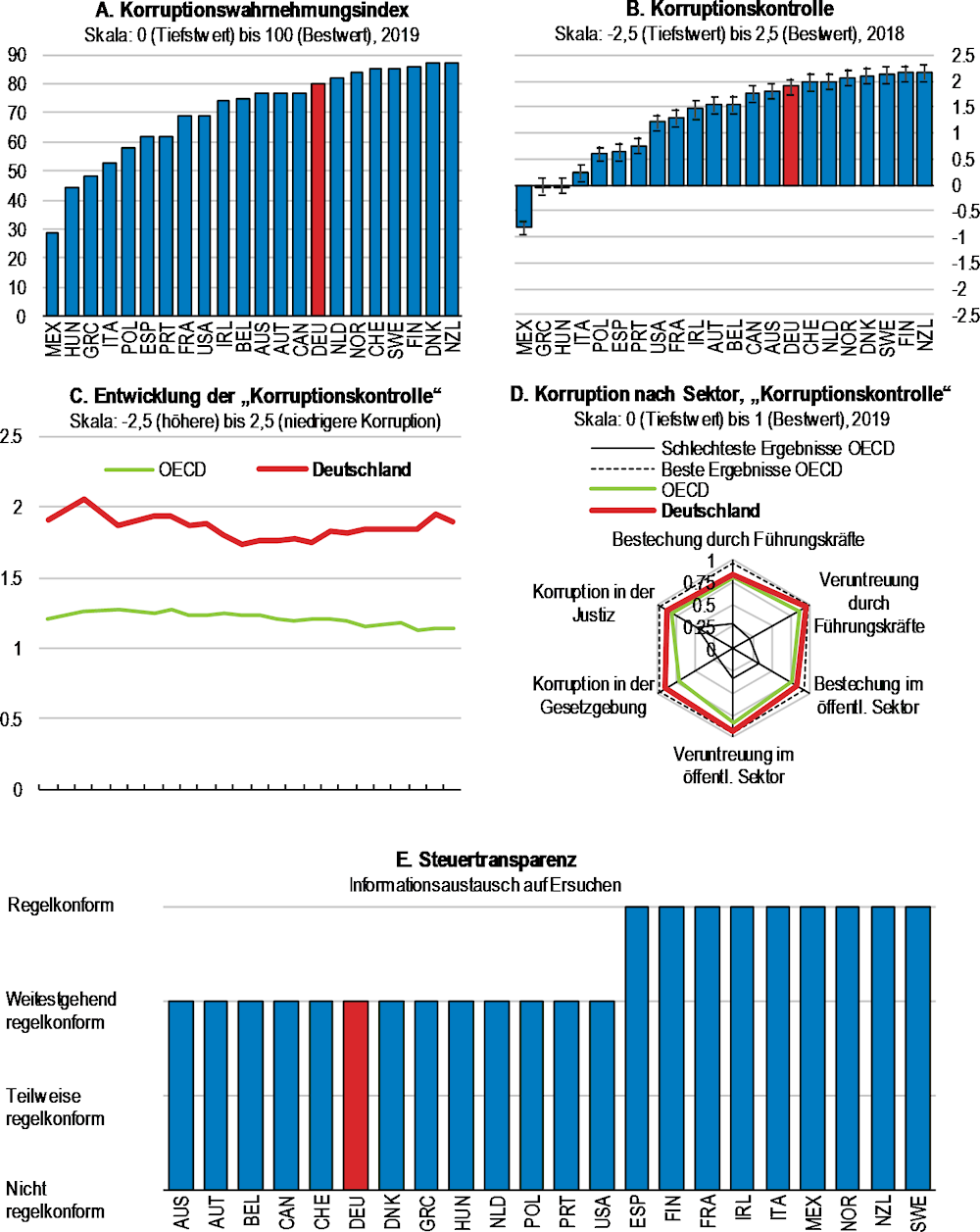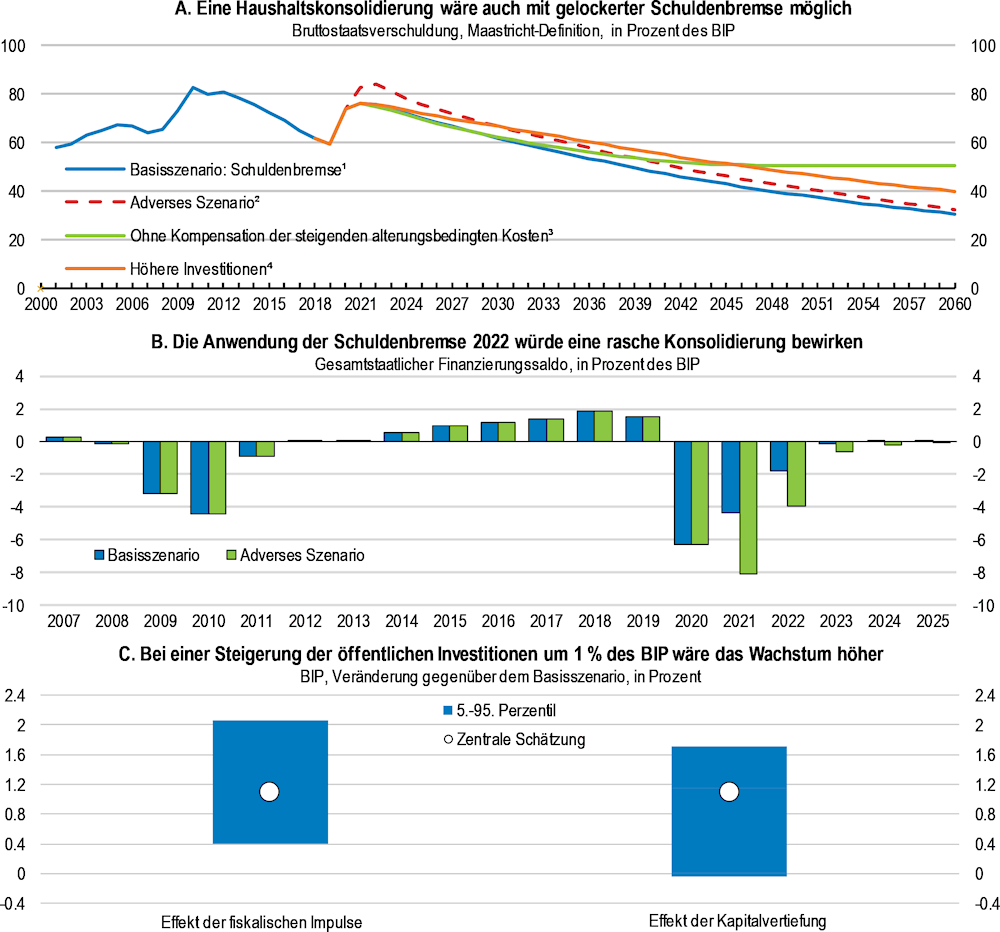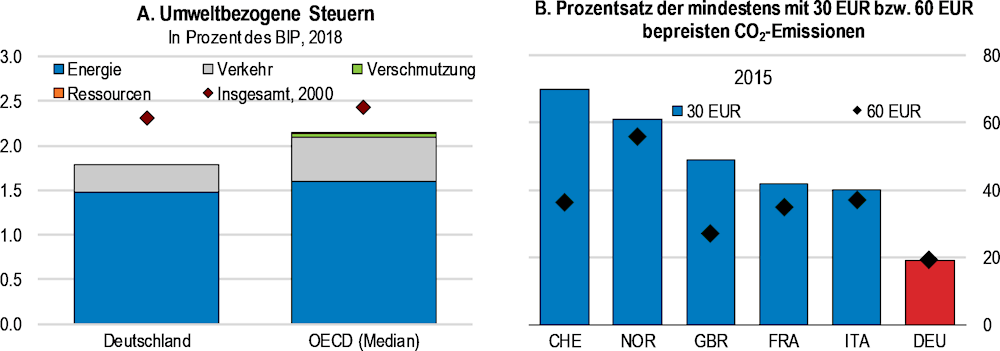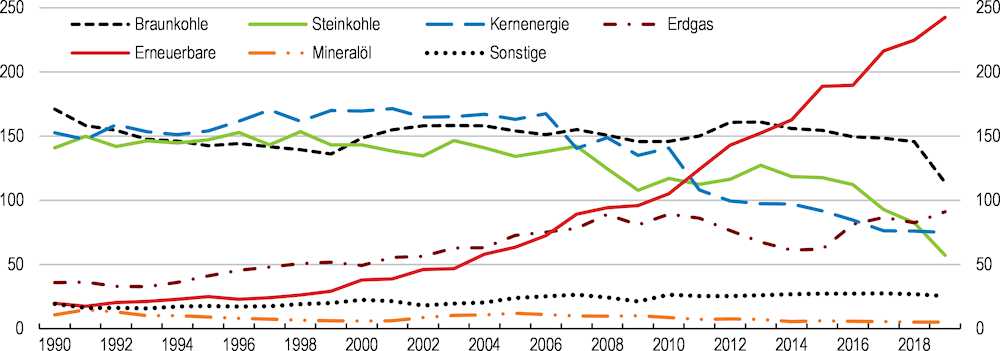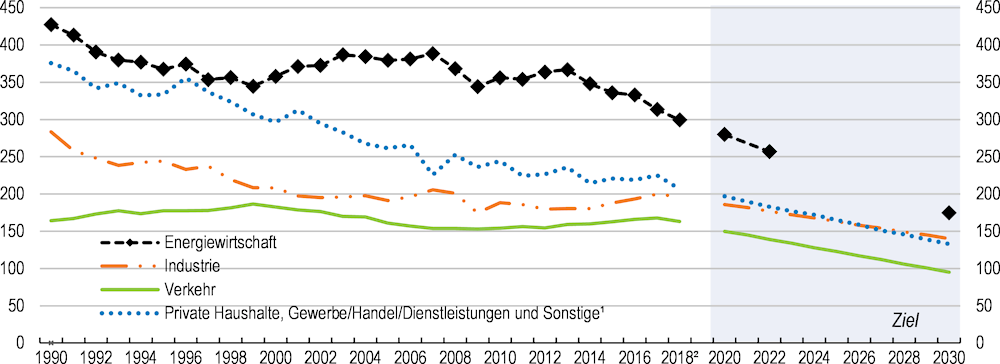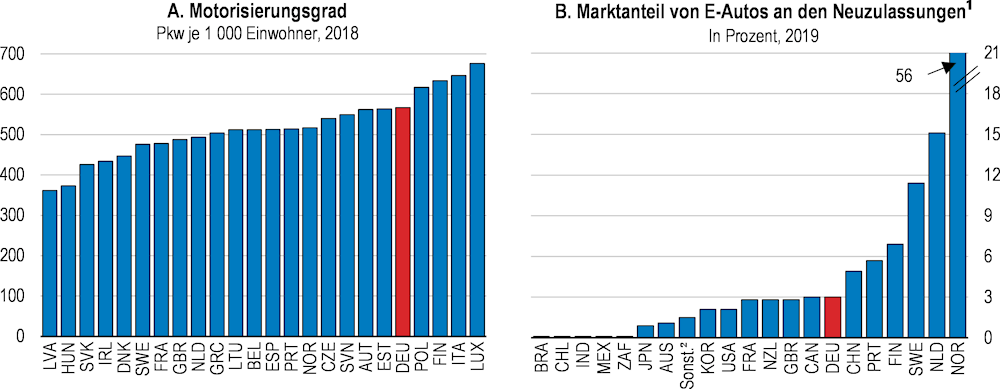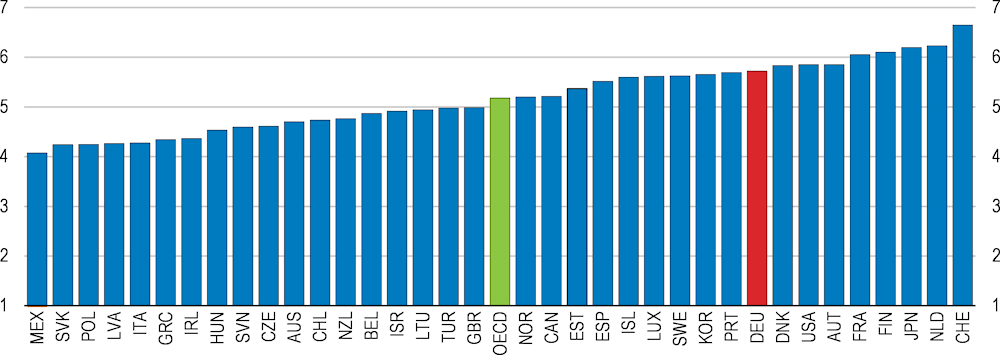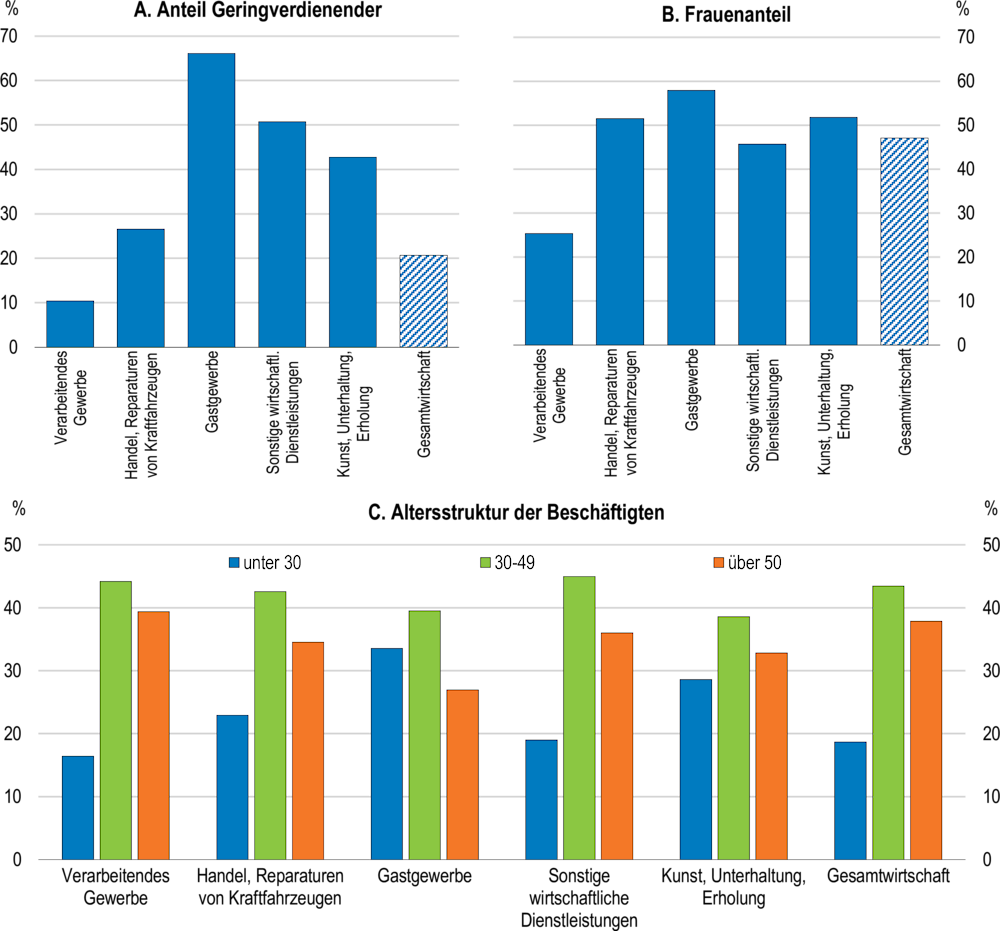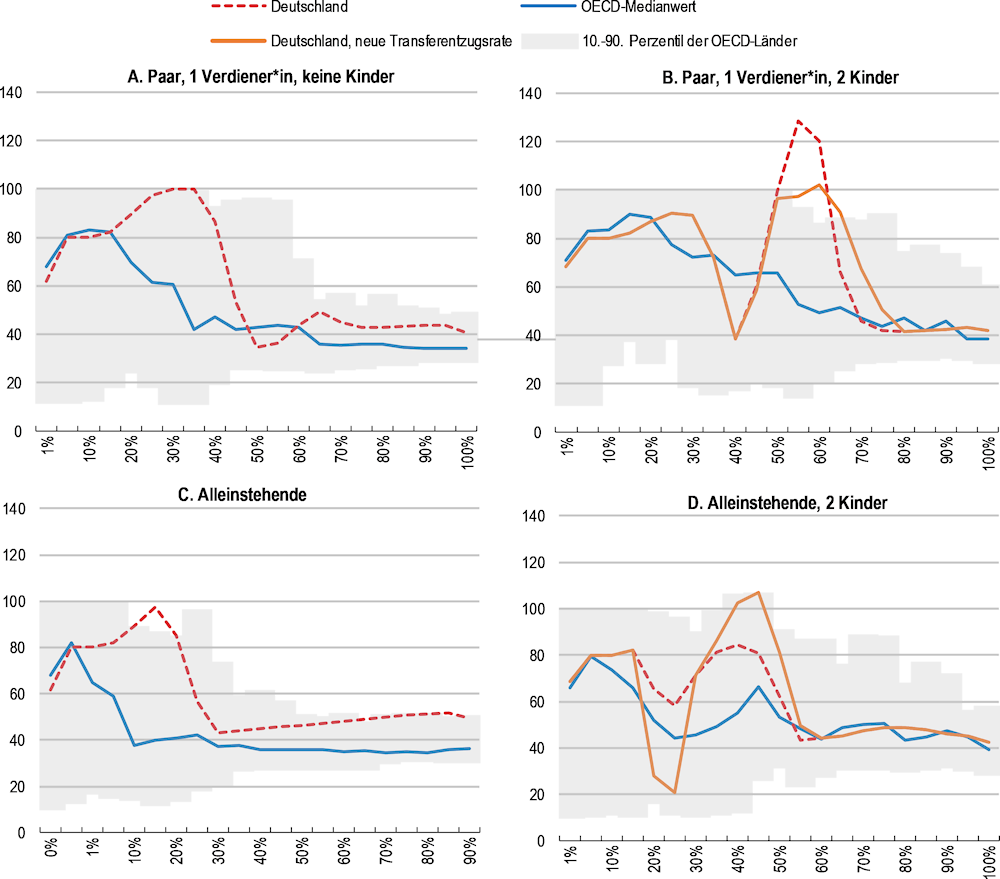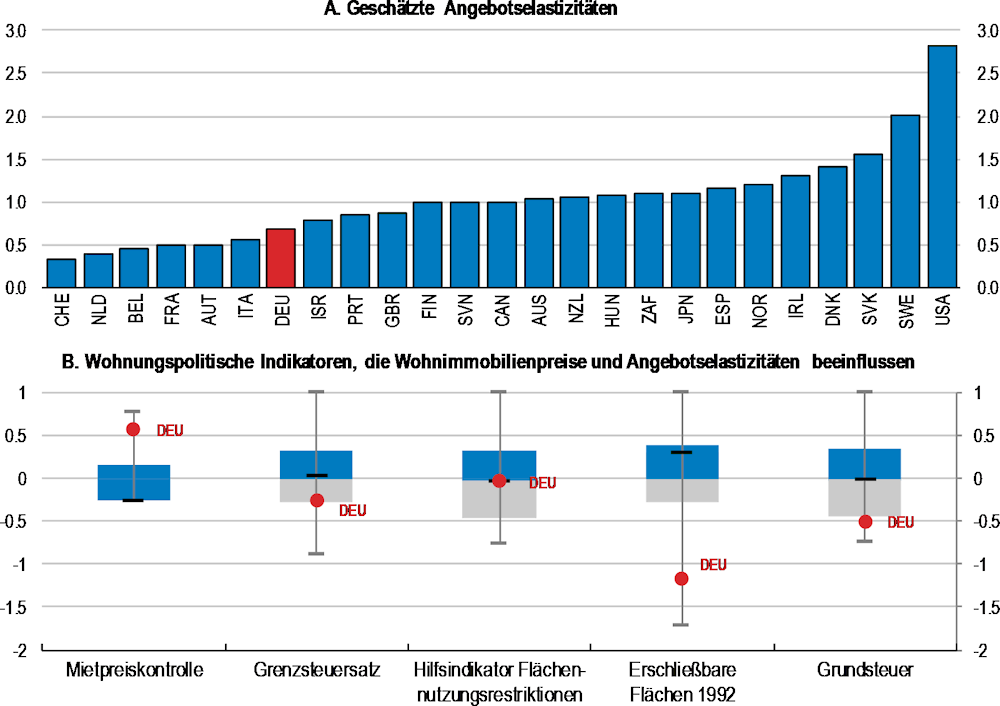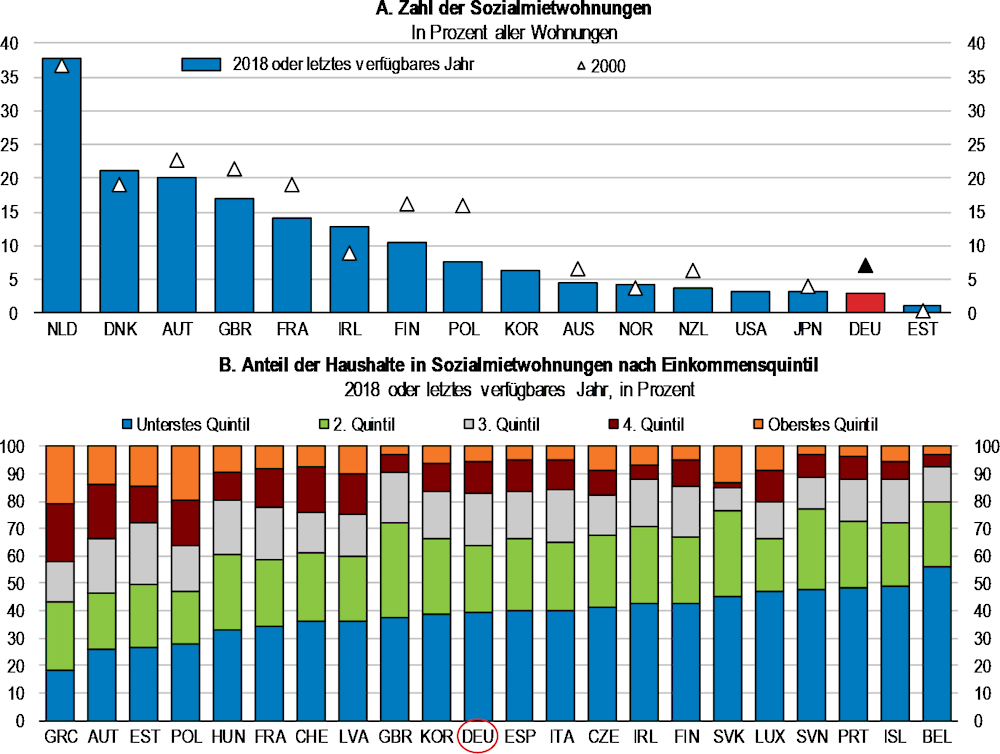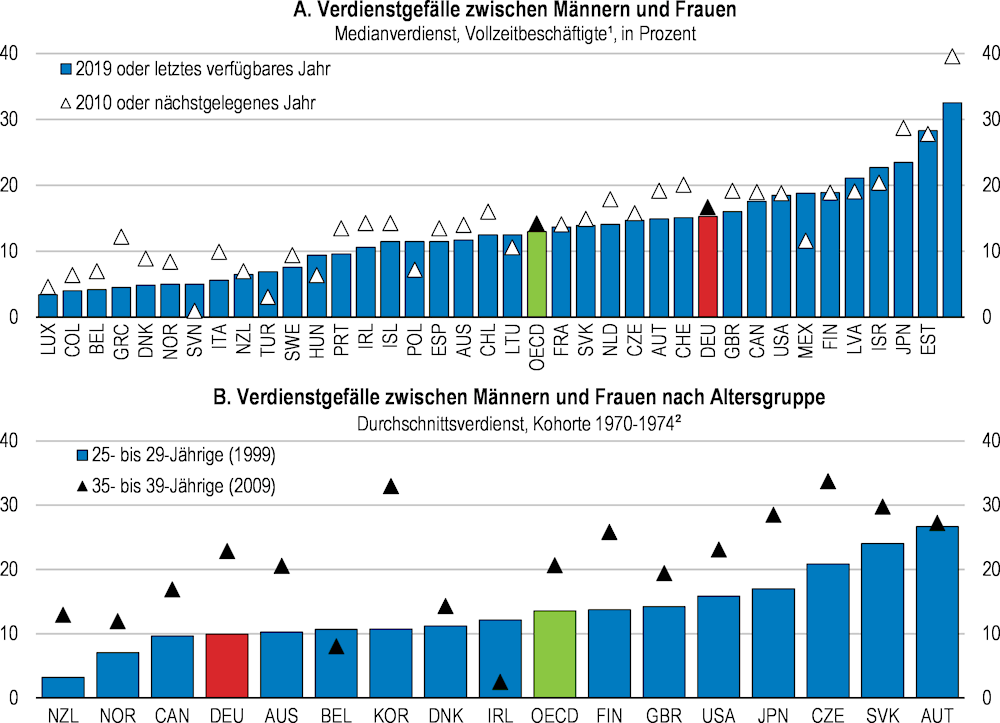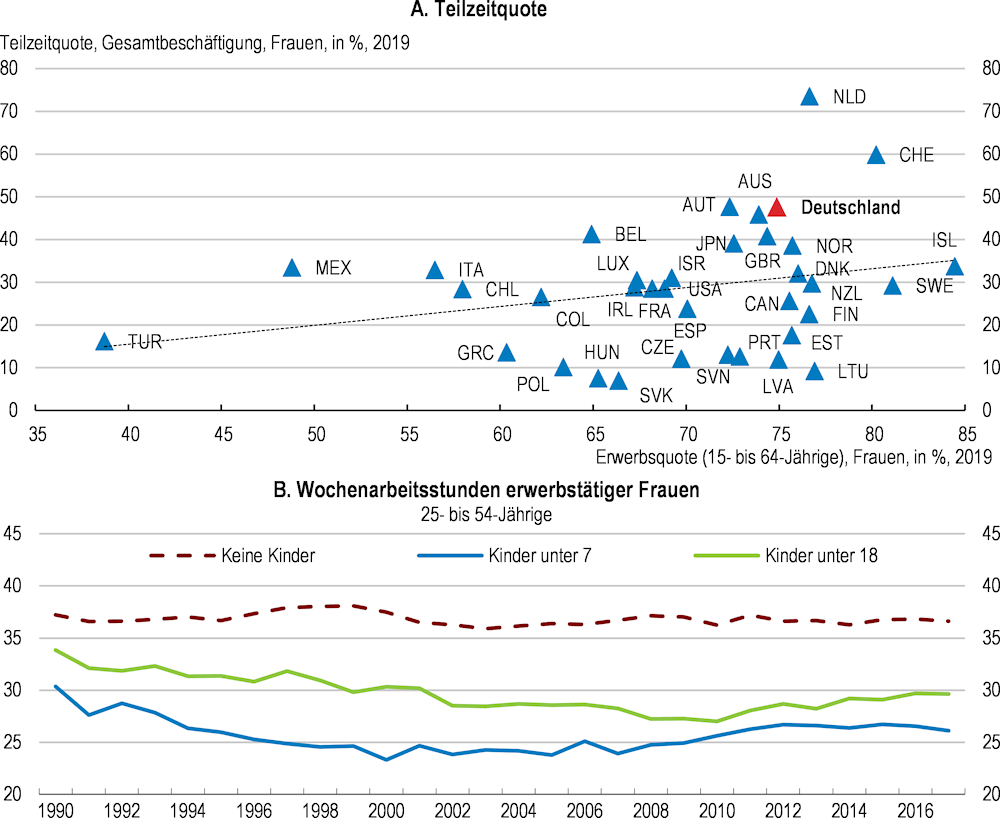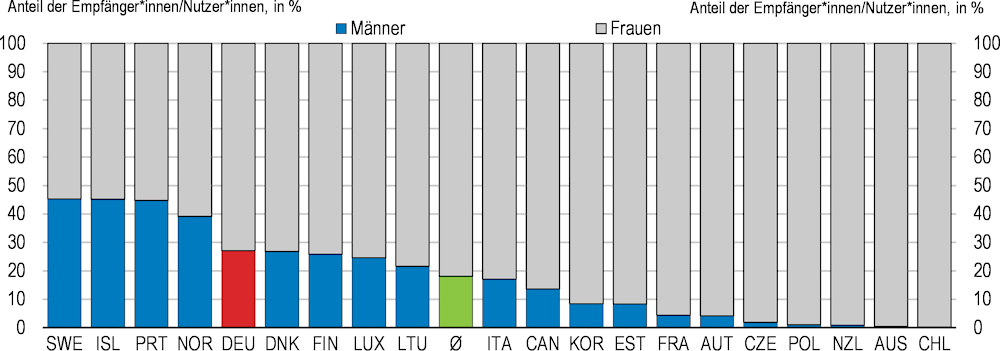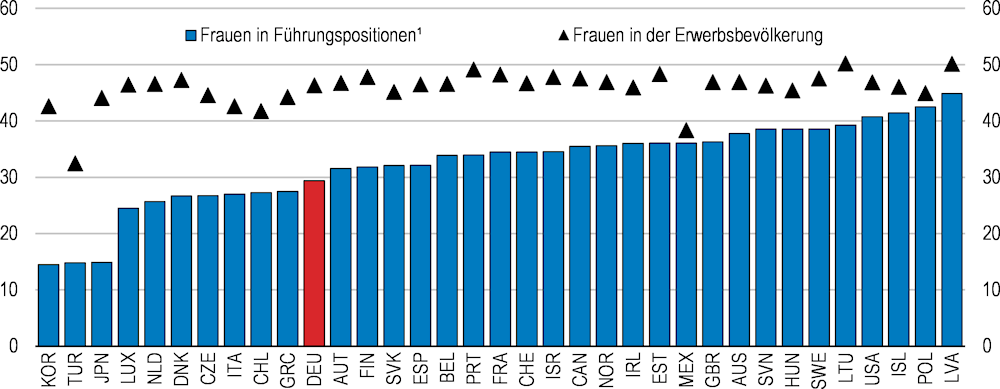[44] Afonso, A. und M. St. Aubyn (2008), “Macroeconomic rates of return of public and private investment: crowding-in and crowding-out effects”, ECB Working Paper, No. 864, https://www.ecb.europa.eu/pub/pdf/scpwps/ecbwp864.pdf.
[87] Aghion, P. et al. (2016), “Carbon Taxes, Path Dependency, and Directed Technical Change: Evidence from the Auto Industry”, Journal of Political Economy, Vol. 124/1, https://doi.org/10.1086/684581.
[118] Ahrend, R., C. Gamper und A. Schumann (2014), “The OECD Metropolitan Governance Survey: A Quantitative Description of Governance Structures in large Urban Agglomerations”, OECD Regional Development Working Papers, No. 2014/4, OECD Publishing, Paris, https://doi.org/10.1787/5jz43zldh08p-en.
[135] Alipour, J., O. Falck und S. Schüller (2020), “Germany’s Capacities to Work from Home”, IZA Discussion Paper, No. 13152, http://ftp.iza.org/dp13152.pdf.
[75] Allain-Dupré, D., C. Hulbert und M. Vincent (2017), “Subnational Infrastructure Investment in OECD Countries: Trends and Key Governance Levers”, OECD Regional Development Working Papers, No. 2017/05, OECD Publishing, Paris, https://dx.doi.org/10.1787/e9077df7-en.
[140] Alt, C. et al. (2018), DJI-Kinderbetreuungsreport 2018: Inanspruchnahme und Bedarfe bei Kindern bis 14 Jahre aus Elternperspektive – ein Bundesländervergleich, Deutsches Jugendinstitut, München, https://www.dji.de/fileadmin/user_upload/bibs2019/DJI_Kinderbetreuungsreport2018_4.pdf.
[81] Arup (2017), International Infrastructure Governance Report, Bericht für die National Infrastructure Commission, https://www.nic.org.uk/wp-content/uploads/NIC-International-Infrastructure-Governance-Report.pdf.
[54] Bach, S. et al. (2020), “Nachbesserungen beim Klimapaket richtig, aber immer noch unzureichend – CO2-Preise stärker erhöhen und Klimaprämie einführen”, DIW aktuell, No. 27, Deutsches Institut für Wirtschaftsforschung, Berlin, https://www.diw.de/documents/publikationen/73/diw_01.c.739525.de/diw_aktuell_27.pdf.
[111] Baldenius, T., S. Kohl und M. Schularick (2019), “Die neue Wohnungsfrage - Gewinner und Verlierer des deutschen Immobilienbooms”, Paper, Microfinance Lab Bonn, http://www.macrohistory.net/wp-content/uploads/2019/06/Die-neue-Wohnungsfrage-.pdf.
[2] Balestra, C. und R. Tonkin (2018), “Inequalities in household wealth across OECD countries: Evidence from the OECD Wealth Distribution Database”, OECD Statistics Working Papers, No. 2018/01, OECD Publishing, Paris, https://dx.doi.org/10.1787/7e1bf673-en.
[34] Bambalaite, I., G. Nicoletti und C. von Rueden (2020), “Occupational entry regulations and their effects on productivity in services: Firm-level evidence”, OECD Economics Department Working Papers, No. 1605, OECD Publishing, Paris, https://dx.doi.org/10.1787/c8b88d8b-en.
[80] Bardt, H. et al. (2014), Infrastruktur zwischen Standortvorteil und Investitionsbedarf, Institut der deutschen Wirtschaft Köln, Köln, https://www.iwkoeln.de/fileadmin/publikationen/2014/145161/IW-Studie_Infrastruktur.pdf.
[71] Bardt, H. et al. (2019), “Für eine solide Finanzpolitik – Investitionen ermöglichen!”, IW Policy Paper, No. 10/19, IW und IMK, https://www.iwkoeln.de/fileadmin/user_upload/Studien/policy_papers/PDF/2019/IW-Policy-Paper_2019_Investitionen.pdf.
[47] Bertelsmann Stiftung (2017), Grenzbelastungen im Steuer-, Abgaben- und Transfersystem, Bertelsmann Stiftung, Gütersloh, https://www.bertelsmann-stiftung.de/fileadmin/files/BSt/Publikationen/GrauePublikationen/NW_Steuer_und_Transfersystem.pdf.
[39] Biewen, M., B. Fitzenberger und J. De Lazzer (2017), “A replication of ‘Entry regulation and entrepreneurship: a natural experiment in German craftsmanship’”, ifh Working Paper, No. 2, https://www.ifh.wiwi.uni-goettingen.de/upload/veroeffentlichungen/WP/ifh_wp-2_2016_update.pdf.
[45] Blanchard, O. (2019), “Public Debt and Low Interest Rates”, American Economic Review, Vol. 109/4, S. 1197-1229, http://dx.doi.org/10.1257/aer.109.4.1197.
[48] Blömer, M., S. Litsche und A. Peichl (2019), “Reformoptionen für die Grundsicherung von Erwerbstätigen”, ifo Forschungsberichte, No. 108, Kurzexpertise im Auftrag des Sachverständigenrats zur Begutachtung der gesamtwirtschalichen Entwicklung, ifo Institut, München, https://www.ifo.de/DocDL/ifo_Forschungsberichte_108_2019_Reformoptionen-Grundsicherung_4.pdf.
[151] BMFSFJ (2019), Bericht der Bundesregierung zur Wirksamkeit des Gesetzes zur Förderung der Entgelttransparenz zwischen Frauen und Männern, Bundesministerium für Familie, Senioren, Frauen und Jugend, Berlin, https://www.bmfsfj.de/blob/137224/79c7431772c314367059abc8a3242a55/bericht-der-br-foerderung-entgelttransparenz-data.pdf.
[123] BMUB (2015), Bericht der Baukostensenkungskommission im Rahmen des Bündnisses für bezahlbares Wohnen und Bauen – Endbericht, Bundesministerium für Umwelt, Naturschutz, Bau und Reaktorsicherheit, Berlin, https://www.bmi.bund.de/SharedDocs/downloads/DE/publikationen/themen/bauen/wohnen/buendnis-bezahlbares-wohnen-baukostensenkungskommission.pdf?__blob=publicationFile&v=3.
[101] Boeri, T., P. Cahuc und A. Zylberberg (2015), “The Costs of Flexibility-Enhancing Structural Reforms: A Literature Review”, OECD Economics Department Working Papers, No. 1264, OECD Publishing, Paris, https://dx.doi.org/10.1787/5jrs558c5r5f-en.
[129] Boll, C. und A. Lagemann (2018), Gender pay gap in EU countries based on SES (2014), Amt für Veröffentlichungen der Europäischen Union, Luxemburg, http://dx.doi.org/10.2838/978935.
[36] Bol, T. (2014), “Economic returns to occupational closure in the German skilled trades”, Social Science Research, Vol. 46, S. 9-22, http://dx.doi.org/10.1016/j.ssresearch.2014.02.003.
[131] Bönke, T. et al. (2020), Wer gewinnt? Wer verliert? Die Entwicklung und Prognose von Lebenserwerbseinkommen in Deutschland, Bertelsmann Stiftung, Gütersloh, https://dx.doi.org/10.11586/2019055.
[93] Börkey, P. und E. Barteková (erscheint demnächst), “Digitalisation and the circular economy”, OECD Environment Working Paper, OECD Publishing, Paris.
[106] Bruckmeier, K., J. Mühlhan und J. Wiemers (2018), “Erwerbstätige im unteren Einkommensbereich stärken – Ansätze zur Reform von Arbeitslosengeld II, Wohngeld und Kinderzuschlag”, IAB-Forschungsbericht, Nr. 9/2018, Institut für Arbeitsmarkt- und Berufsforschung, Nürnberg, http://doku.iab.de/forschungsbericht/2018/fb0918.pdf.
[100] Caliendo, M., C. Schröder und L. Wittbrodt (2019), “The Causal Effects of the Minimum Wage Introduction in Germany – An Overview”, German Economic Review, Vol. 20/3, S. 257-292, https://doi.org/10.1111/geer.12191.
[16] Carare, A. und S. Danninger (2008), “Inflation Smoothing and the Modest Effect of VAT in Germany”, IMF Working Paper, WP/08/175, IWF, Washington, D.C., https://www.imf.org/external/pubs/ft/wp/2008/wp08175.pdf.
[105] Card, D., J. Kluve und A. Weber (2018), ““What Works? A Meta Analysis of Recent Active Labor Market Program Evaluations”, Journal of the European Economic Association, Vol. 16/3, S. 894-931, http://dx.doi.org/10.1093/jeea/jvx028.
[117] Causa, O. und J. Pichelmann (2020), “Should I stay or should I go? Housing and residential mobility across OECD countries”, OECD Economics Department Working Papers, No. 1626, OECD Publishing, Paris, https://dx.doi.org/10.1787/d91329c2-en.
[110] Causa, O., N. Woloszko und D. Leite (2019), “Housing, wealth accumulation and wealth distribution: Evidence and stylized facts”, OECD Economics Department Working Papers, No. 1588, OECD Publishing, Paris, https://dx.doi.org/10.1787/86954c10-en.
[119] Cavalleri, M., B. Cournède und E. Özsöğüt (2019), “How responsive are housing markets in the OECD? National level estimates”, OECD Economics Department Working Papers, No. 1589, OECD Publishing, Paris, https://doi.org/10.1787/4777e29a-en.
[24] Centre for European Policy Studies (2017), An Assessment of the Economic Impact of Brexit on the EU27, Studie für die Fachabteilung Wirtschaft, Wissenschaft und Lebensqualität, Europäisches Parlament, https://www.europarl.europa.eu/RegData/etudes/STUD/2017/595374/IPOL_STU(2017)595374_EN.pdf.
[133] Chung, H. und M. van der Horst (2018), “Women’s employment patterns after childbirth and the perceived access to and use of flexitime and teleworking”, Human Relations, Vol. 71/1, S. 47-72, https://doi.org/10.1177/0018726717713828.
[11] Committee on Climate Change (2019), Net Zero: The UK’s contribution to stopping global warming, Committee on Climate Change, London, https://www.theccc.org.uk/publication/net-zero-the-uks-contribution-to-stopping-global-warming/.
[89] Convery, F., S. McDonnell und S. Ferreira (2007), “The most popular tax in Europe? Lessons from the Irish plastic bags levy”, Environmental and Resource Economics, Vol. 38/1, S. 1-11, https://dx.doi.org/10.1007/s10640-006-9059-2.
[14] Crossley, T., H. Low und C. Sleeman (2014), “Using a temporary indirect tax cut as a fiscal stimulus: evidence from the UK”, IFS Working Paper, W14/16, Institute for Fiscal Studies, London, http://dx.doi.org/10.1920/wp.ifs.2014.1416.
[28] de Guindos, L., F. Panetta und I. Schnabel (2020), “Europe needs a fully fledged capital markets union – now more than ever”, The ECB Blog, 2. September, https://www.ecb.europa.eu/press/blog/date/2020/html/ecb.blog200902~c168038cbc.en.html.
[57] Dechezleprêtre, A., D. Nachtigall und F. Venmans (2018), “The joint impact of the European Union emissions trading system on carbon emissions and economic performance”, OECD Economics Department Working Papers, No. 1515, OECD Publishing, Paris, https://dx.doi.org/10.1787/4819b016-en.
[10] Dechezleprêtre, A., N. Rivers und B. Stadler (2019), “The economic cost of air pollution: Evidence from Europe”, OECD Economics Department Working Papers, No. 1584, OECD Publishing, Paris, https://dx.doi.org/10.1787/56119490-en.
[78] Demmou, L. und G. Franco (2020), “Do sound infrastructure governance and regulation affect productivity growth? New insights from firm level data”, OECD Economics Department Working Papers, No. 1609, OECD Publishing, Paris, https://dx.doi.org/10.1787/410535403555.
[124] dena (2019), dena-GEBÄUDEREPORT KOMPAKT 2019: Statistiken und Analysen zur Energieeffizienz im Gebäudebestand, Deutsche Energie-Agentur, Berlin, https://www.dena.de/fileadmin/dena/Publikationen/PDFs/2019/dena-GEBAEUDEREPORT_KOMPAKT_2019.pdf.
[29] Deutsche Bundesbank (2020), Finanzstabilitätsbericht 2020, Deutsche Bundesbank, Frankfurt am Main, https://www.bundesbank.de/de/publikationen/berichte/finanzstabilitaetsberichte/finanzstabilitaetsbericht-2020-847060.
[30] Deutsche Bundesbank (2018), Contingent convertible bonds: design, regulation, usefulness, März, S. 53-66, Deutsche Bundesbank, Frankfurt am Main, https://www.bundesbank.de/resource/blob/723246/55a7c2ac39540ff1ffe895e92700e311/mL/2018-03-cocos-data.pdf.
[15] Deutsche Bundesbank (o.J.), “Aktuelle Monatsberichte”, https://www.bundesbank.de/de/publikationen/berichte/monatsberichte (Abruf: 3. August 2020).
[32] di Mauro, F. und C. Syverson (2020), “The COVID crisis and productivity growth”, VoxEU.org, 16. April, https://voxeu.org/article/covid-crisis-and-productivity-growth.
[49] DIW (2016), “Erbschaftsteuer in Deutschland”, DIW Wochenbericht, Nr. 3, Deutsches Institut für Wirtschaftsforschung, Berlin, https://www.diw.de/documents/publikationen/73/diw_01.c.524688.de/16-3.pdf.
[5] Dräger, J. und N. Müller (2020), “Wealth stratification in the early school career in Germany”, Research in Social Stratification and Mobility, Vol. 67, https://doi.org/10.1016/j.rssm.2020.100483.
[52] Dussaux, D. (2020), “The joint effects of energy prices and carbon taxes on environmental and economic performance: Evidence from the French manufacturing sector”, OECD Environment Working Papers, No. 154, OECD Publishing, Paris, https://dx.doi.org/10.1787/b84b1b7d-en.
[127] Economidou, M. und P. Bertoldi (2015), “Practices to Overcome Split Incentives in the EU Building Stock”, ECEEE Summer Study Proceedings, S. 1343-1353, https://www.eceee.org/library/conference_proceedings/eceee_Summer_Studies/2015/6-policies-and-programmes-towards-a-zero-energy-building-stock/practices-to-overcome-split-incentives-in-the-eu-building-stock/2015/6-232-15_Economidou.pdf.
[67] Edenhofer, O. et al. (2019), “Bewertung des Klimapakets und nächste Schritte”, Arbeitspapier, Mercator Research Institute and Potsdam Institute on Global Commons and Climate Change, https://www.mcc-berlin.net/fileadmin/data/B2.3_Publications/Working%20Paper/2019_MCC_Bewertung_des_Klimapakets_final.pdf.
[9] EEA (2019), Air pollution country fact sheet: Germany, European Environment Agency, Luxemburg, https://www.eea.europa.eu/themes/air/country-fact-sheets/2019-country-fact-sheets/germany.
[8] EEA (2019), Air Quality in Europe, European Environment Agency, Luxemburg, https://www.eea.europa.eu//publications/air-quality-in-europe-2019.
[73] EIB (2017), Investment Report 2017/18: From recovery to sustainable growth, Europäische Investitionsbank, Luxemburg, https://dx.doi.org/10.2867/48630.
[51] Ellis, J., D. Nachtigall und F. Venmans (2019), “Carbon pricing and competitiveness: Are they at odds?”, OECD Environment Working Papers, No. 152, OECD Publishing, Paris, https://dx.doi.org/10.1787/f79a75ab-en.
[91] EUA (2020), “Construction and demolition waste: challenges and opportunities in a circular economy”, Briefing, No. 14/2019, Europäische Umweltagentur, https://dx.doi.org/10.2800/07321.
[59] EUA (2019), Trends and projections in Europe 2019: Tracking progress towards Europe’s climate and energy targets, EEA Report, No. 15, Europäische Umweltagentur, Veröffentlichungen der Europäischen Union, Luxemburg, https://dx.doi.org/10.2800/51114.
[42] Europäische Kommission (2017), “Flash Eurobarometer 457: Businesses’ attitudes towards corruption in the EU”, Datensatz, Offenes Datenportal der EU, https://data.europa.eu/euodp/en/data/dataset/S2177_457_ENG.
[41] Europäische Kommission (2017), “Special Eurobarometer 470: Corruption”, Datensatz, Offenes Datenportal der EU, https://data.europa.eu/euodp/en/data/dataset/S2176_88_2_470_ENG.
[88] Europäische Kommission (o.J.), “The Environmental Implementation Review”, https://ec.europa.eu/environment/eir/index_en.htm.
[1] Eurostat (2018), “Almost half the unemployed at risk of monetary poverty in the EU”, Eurostat News, 26. Februar, https://ec.europa.eu/eurostat/web/products-eurostat-news/-/DDN-20180226-1.
[40] Farronato, C. et al. (2020), “Consumer Protection in an Online World: An Analysis of Occupational Licensing”, NBER Research Working Paper Series, No. 26601, National Bureau of Economic Research, Cambridge, MA, http://dx.doi.org/10.3386/w26601.
[26] Felbermayr, G. et al. (2017), “Economic Effects of Brexit on the European Economy”, EconPol Policy Report, No. 4, ifo Institut, München, https://www.ifo.de/DocDL/EconPol_Policy_Report_04_2017_Brexit.pdf.
[58] Flues, F. und K. van Dender (2020), “Carbon pricing design: Effectiveness, efficiency and feasibility: An investment perspective”, OECD Taxation Working Papers, No. 48, OECD Publishing, Paris, https://dx.doi.org/10.1787/91ad6a1e-en.
[70] Fratzscher, M. et al. (2015), Stärkung von Investitionen in Deutschland, Bericht der Expertenkommission im Auftrag des BMWi, Berlin, https://www.bmwi.de/Redaktion/DE/Publikationen/Studien/staerkung-von-investitionen-in-deutschland.pdf.
[138] Gambaro, L., J. Marcus und F. Peter (2019), “School entry, afternoon care, and mothers’ labour supply”, Empirical Economics, Vol. 57/3, S. 769-803, https://doi.org/10.1007/s00181-018-1462-3.
[43] Gechert, S. und A. Rannenberg (2018), “Which Fiscal Multipliers are Regime-Dependent? A Meta-Regression Analysis”, Journal of Economic Surveys, Vol. 32/4, S. 1160-1182, http://dx.doi.org/10.1111/joes.12241.
[141] Geis-Thöne, W. (2020), “Kinderbetreuung – Über 340.000 Plätze für unter Dreijährige fehlen”, IW-Kurzbericht, Nr. 96, Institut der deutschen Wirtschaft Köln, Köln, https://www.iwkoeln.de/fileadmin/user_upload/Studien/Kurzberichte/PDF/2020/IW-Kurzbericht_2020-_Kinderbetreuung.pdf.
[74] Global Infrastructure Hub (2019), Leading Practices in Governmental Processes Facilitating Infrastructure Project Preparation, https://cdn.gihub.org/umbraco/media/2344/gih_project-preparation_full-document_final_art_web.pdf.
[72] Gornig, V. und C. Michelsen (2017), “Kommunale Investitionsschwäche: Engpässe bei Planungs- und Baukapazitäten bremsen Städte und Gemeinden aus”, DIW Wochenbericht, Nr. 11, S. 211-219, Deutsches Institut für Wirtschaftsforschung, Berlin, https://www.diw.de/documents/publikationen/73/diw_01.c.554462.de/17-11-5.pdf.
[104] Grabka, M. und C. Schröder (2019), “Der Niedriglohnsektor in Deutschland ist größer als bislang angenommen”, DIW Wochenbericht, Nr. 14, S 249-257, Deutsches Institut für Wirtschaftsforschung, Berlin, https://www.diw.de/documents/publikationen/73/diw_01.c.618178.de/19-14-3.pdf.
[77] Grömling, M. und T. Puls (2018), “Infrastrukturmängel in Deutschland”, IW-Trends, Nr. 2/2018, Institut der deutschen Wirtschaft Köln, Köln, https://www.iwkoeln.de/fileadmin/user_upload/Studien/IW-Trends/PDF/2018/IW-Trends_2018-02-06_Infrastrukturm%C3%A4ngel.pdf.
[134] Grunau, P., S. Steffes und S. Wolter (2020), “Homeoffice in Zeiten von Corona, In vielen Berufen gibt es bislang ungenutzte Potenziale”, ZEW-Kurzexpertise, Nr. 20-03, Leibniz-Zentrum für Europäische Wirtschaftsforschung, Mannheim, http://ftp.zew.de/pub/zew-docs/ZEWKurzexpertisen/ZEW_Kurzexpertise2003.pdf.
[98] Hammerschmid, A., J. Schmieder und K. Wrohlich (2020), “Frauen in Corona-Krise stärker am Arbeitsmarkt betroffen als Männer”, DIW aktuell, Nr. 42, Deutsches Institut für Wirtschaftsforschung, Berlin, https://www.diw.de/documents/publikationen/73/diw_01.c.789749.de/diw_aktuell_42.pdf.
[96] Heinrich, K. (2017), “How San Francisco Achieved a High Performing Food Waste Composting Program”, Beyond Food Waste, 9. Juni, https://beyondfoodwaste.com/what-makes-san-franciscos-food-recycling-program-successful/.
[68] Hepburn, C. et al. (2020), “Will COVID-19 fiscal recovery packages accelerate or retard progress on climate change?”, Smith School Working Paper, No. 20-02, Oxford Smith School of Enterprise and the Environment, Oxford, https://www.smithschool.ox.ac.uk/publications/wpapers/workingpaper20-02.pdf.
[20] Heymann, E. (2020), E-mobility. Remaining a niche phenomenon for now – at least without subsidies, http://www.dbresearch.com (Abruf: 29. Juni 2020).
[19] Hijzen, A. und S. Martin (2013), “The Role of Short-Time Work Schemes during the Global Financial Crisis and Early Recovery: A Cross-Country Analysis”, IZA Discussion Paper, No. 7291, http://ftp.iza.org/dp7291.pdf.
[121] Holm, A. und C. Sprengard (2015), Kritische Betrachtung der Kostensteigerung im Mehrfamilienhausneubau durch Einführung der EnEV 2016, FIW München, Gräfelfing, https://www.fiw-muenchen.de/media/pdf/fiw_2015_11_08_enev_als_kostentreiber.pdf.
[144] Huerta, M. et al. (2013), “Fathers’ Leave, Fathers’ Involvement and Child Development: Are They Related? Evidence from Four OECD Countries”, OECD Social, Employment and Migration Working Papers, No. 140, OECD Publishing, Paris, https://doi.org/10.1787/5k4dlw9w6czq-en.
[120] IEA (2020), Germany 2020: Energy Policy Review, Internationale Energieagentur, OECD Publishing, Paris, https://doi.org/10.1787/cedb9b0a-en.
[56] IEA (2019), Energy Policies of IEA Countries: Germany 2019 Review, Internationale Energieagentur, Paris.
[107] Immervoll, H. und M. Pearson (2009), “A Good Time for Making Work Pay? Taking Stock of In-Work Benefits and Related Measures across the OECD”, OECD Social, Employment and Migration Working Papers, No. 81, OECD Publishing, Paris, https://doi.org/10.1787/225442803245.
[79] ITF (2017), “Strategic Infrastructure Planning: International Best Practice”, International Transport Forum Policy Papers, No. 29, Weltverkehrsforum, OECD Publishing, Paris, https://doi.org/10.1787/4142787d-en.
[17] IWF (2020), World Economic Outlook: The Great Lockdown, Internationaler Währungsfonds, Washington, D.C., April, https://www.imf.org/en/Publications/WEO/Issues/2020/04/14/weo-april-2020 (Abruf: 4. August 2020).
[3] IWF (2019), “Germany: Selected Issues”, IMF Country Report, No. 19/214, Internationaler Währungsfonds, Washington, D.C., https://www.imf.org/en/Publications/CR/Issues/2019/07/09/Germany-Selected-Issues-47094.
[97] Kalina, T. und C. Weinkopf (2018), “Niedriglohnbeschäftigung 2016 – beachtliche Lohnzuwächse im unteren Lohnsegment, aber weiterhin hoher Anteil von Beschäftigten mit Niedriglöhnen”, IAQ-Report, Nr. 06-2018, Institut Arbeit und Qualifikation, Duisburg, https://www.iaq.uni-due.de/iaq-report/2018/report2018-06.pdf.
[112] Kangasharju, A. (2010), “Housing Allowance and the Rent of Low-Income Households”, Scandinavian Journal of Economics, Vol. 112/3, S. 595-617, https://doi.org/10.1111/j.1467-9442.2010.01615.x.
[22] Karlsson, J., H. Melin und K. Cullinane (2018), “The impact of potential Brexit scenarios on German car exports to the UK: an application of the gravity model”, Journal of Shipping and Trade, Vol. 3/1, http://dx.doi.org/10.1186/s41072-018-0038-x.
[69] KfW Research (2020), “Corona trifft die Kommunen mit voller Wucht – Investitionen sichern trotz Krise!”, Kurzfassung des KfW-Kommunalpanels 2020, KfW Research, Frankfurt, https://www.kfw.de/PDF/Download-Center/Konzernthemen/Research/PDF-Dokumente-KfW-Kommunalpanel/KfW-Kommunalpanel-2020-Kurzfassung.pdf.
[116] Kholodilin, K. und S. Kohl (2019), Die Regulierung des Wohnungsmarkts hat weltweit zum Siegeszug des Eigenheims beigetragen, Nr. 38, S. 701-710, Deutsches Institut für Wirtschaftsforschung, Berlin, https://www.diw.de/documents/publikationen/73/diw_01.c.678543.de/19-38-3.pdf.
[150] Kirsch, A. und K. Wrohlich (2020), “Frauenanteile in Spitzengremien großer Unternehmen steigen – abgesehen von Aufsichtsräten im Finanzsektor”, DIW Wochenbericht, Nr. 4/2020, S. 28-49, Deutsches Institut für Wirtschaftsforschung, Berlin, https://www.diw.de/documents/publikationen/73/diw_01.c.703378.de/20-4-2.pdf.
[66] Kommission „Wachstum, Strukturwandel und Beschäftigung“ (2019), Abschlussbericht, Bundesministerium für Wirtschaft und Energie, Berlin, https://www.bmwi.de/Redaktion/DE/Publikationen/Wirtschaft/abschlussbericht-kommission-wachstum-strukturwandel-und-beschaeftigung.pdf.
[46] Kommission Verlässlicher Generationenvertrag (2020), Bericht der Kommission Verlässlicher Generationenvertrag: Kurzfassung, https://www.bmas.de/SharedDocs/Downloads/DE/Thema-Rente/Kommission-Verlaesslicher-Generationenvertrag/bericht-der-kommission-kurzfassung.pdf.
[35] Koumenta, M. und M. Pagliero (2019), “Occupational Regulation in the European Union: Coverage and Wage Effects”, British Journal of Industrial Relations, Vol. 57/4, S. 818-849, https://doi.org/10.1111/bjir.12441.
[37] Koumenta, M. und M. Pagliero (2017), Measuring Prevalence and Labour Market Impacts of Occupational Regulation in the EU, Europäische Kommission, https://ec.europa.eu/docsroom/documents/20362/attachments/1/translations/en/renditions/native.
[25] Lawless, M. und E. Morgenroth (2019), “The product and sector level impact of a hard Brexit across the EU”, Contemporary Social Science, Vol. 14/2, S. 189-207, http://dx.doi.org/10.1080/21582041.2018.1558276.
[61] Mattes, B. (2019), “Mattes: Politik muss Automobilstandort Deutschland jetzt wetterfest machen”, Pressemeldung, 4. Dezember, Verband der Automobilindustrie, Berlin, https://www.vda.de/en/press/press-releases/20191204-mattes-policymakers-must-weatherproof-germany-as-an-automotive-location.html.
[86] Mccarthy, A., R. Dellink und R. Bibas (2018), “The Macroeconomics of the Circular Economy Transition: A Circular Review of Modelling Approaches”, OECD Environment Working Papers, No. 130, OECD Publishing, Paris, https://doi.org/10.1787/af983f9a-en.
[115] Mense, A. et al. (2018), “Empirics on the Causal Effects of Rent Control in Germany”, Konferenzpapier für die Jahrestagung des Vereins für Socialpolitik 2018: Digitale Wirtschaft – Session: Inequality III, No. E04-V3, http://hdl.handle.net/10419/181625.
[50] Metcalf, G. und J. Stock (2020), “Measuring the Macroeconomic Impact of Carbon Taxes”, AEA Papers and Proceedings, Vol. 110, S. 101-106, https://doi.org/10.1257/pandp.20201081.
[21] Mönnig, A. et al. (2019), Electromobility 2035 Economic and labour market effects through the electrification of powertrains in passenger cars.
[125] Müller, R. et al. (2016), “Mietrecht und energetische Sanierung im europäischen Vergleich”, BBSR-Online-Publikation, Nr. 13/2016, Bundesinstitut für Bau-, Stadt- und Raumforschung, Bonn, https://www.bbsr.bund.de/BBSR/DE/veroeffentlichungen/bbsr-online/2016/bbsr-online-13-2016-dl.pdf.
[76] NZ Productivity Commission (2013), Primer on local government coordination – Online appendix to the inquiry into local government regulatory performance, New Zealand Productivity Commission, Wellington, https://www.productivity.govt.nz/assets/Documents/6aa777749b/Online-appendix-Primer-on-local-government-coordination.pdf.
[143] Oberhuemer, P. und I. Schreyer (2017), “Frühpädagogisches Personal – Länderbericht Deutschland”, in Personalprofile in Systemen der frühkindlichen Bildung, Erziehung und Betreuung in Europa, P. Oberhuemer und I. Schreyer (Hrsg.), http://www.seepro.eu/Deutsch/Pdfs/DEUTSCHLAND_Fruehpaedagogisches%20Personal.pdf.
[114] OECD (2020), Housing and Inclusive Growth, OECD Publishing, Paris, https://dx.doi.org/10.1787/6ef36f4b-en.
[12] OECD (2020), OECD‑Wirtschaftsausblick, Ausgabe 2020/1 (Kurzfassung), OECD Publishing, Paris, https://dx.doi.org/10.1787/e0331726-de.
[64] OECD (2020), “Productivity gains from teleworking in the post COVID-19 era: How can public policies make it happen?”, OECD Policy Responses to Coronavirus (COVID-19), OECD Publishing, Paris, https://read.oecd-ilibrary.org/view/?ref=135_135250-u15liwp4jd&title=Productivity-gains-from-teleworking-in-the-post-COVID-19-era.
[83] OECD (2020), Recommendation of the Council on the Governance of Infrastructure, OECD/LEGAL/0460, https://legalinstruments.oecd.org/en/instruments/OECD-LEGAL-0460.
[63] OECD (2019), Accelerating Climate Action: Refocusing Policies through a Well-being Lens, OECD Publishing, Paris, https://dx.doi.org/10.1787/2f4c8c9a-en.
[142] OECD (2019), Gute Strategien für gute Berufe in der frühen Bildung, OECD Publishing, Paris, https://doi.org/10.1787/cb63ff14-de.
[102] OECD (2019), Negotiating Our Way Up: Collective Bargaining in a Changing World of Work, OECD Publishing, Paris, https://doi.org/10.1787/1fd2da34-en.
[31] OECD (2019), OECD Economic Surveys: Switzerland 2019, OECD Publishing, Paris, https://dx.doi.org/10.1787/7e6fd372-en.
[84] OECD (2019), Öffentliche Vergabe in Deutschland: Strategische Ansatzpunkte zum Wohl der Menschen und für wirtschaftliches Wachstum, OECD Publishing, Paris, https://doi.org/10.1787/48df1474-de.
[4] OECD (2019), “PISA 2018 Ergebnisse – Ländernotiz Deutschland”, OECD, Paris, https://www.oecd.org/pisa/publications/PISA2018_CN_DEU_German.pdf.
[53] OECD (2018), Effective Carbon Rates 2018: Pricing Carbon Emissions Through Taxes and Emissions Trading, OECD Publishing, Paris, https://dx.doi.org/10.1787/9789264305304-en.
[103] OECD (2018), Good Jobs for All in a Changing World of Work: The OECD Jobs Strategy, OECD Publishing, Paris, https://doi.org/10.1787/9789264308817-en.
[85] OECD (2018), “Improving Plastics Management: Trends, policy responses, and the role of international co-operation and trade”, OECD Environment Policy Papers, No. 12, OECD Publishing, Paris, https://doi.org/10.1787/c5f7c448-en.
[108] OECD (2018), OECD-Wirtschaftsberichte: Deutschland 2018, OECD Publishing, Paris, https://dx.doi.org/10.1787/eco_surveys-deu-2018-de.
[33] OECD (2018), “Product Market Regulation – Country Note: Germany”, OECD, Paris, https://issuu.com/oecd.publishing/docs/ger_country_note_-_final?fr=sMzM1NTkzNTk1MQ.
[132] OECD (2017), Dare to Share – Deutschlands Weg zur Partnerschaftlichkeit in Familie und Beruf, OECD Publishing, Paris, https://doi.org/10.1787/9789264263420-de.
[136] OECD (2017), The Pursuit of Gender Equality – An Uphill Battle, OECD Publishing, Paris, https://doi.org/10.1787/9789264281318-en.
[62] OECD (2016), “Israel’s Green Tax on Cars: Lessons in Environmental Policy Reform”, OECD Environment Policy Papers, No. 5, OECD Publishing, Paris, https://dx.doi.org/10.1787/5jlv5rmnq9wg-en.
[94] OECD (2014), OECD-Wirtschaftsberichte: Deutschland 2014, OECD Publishing, Paris, https://doi.org/10.1787/eco_surveys-deu-2014-de.
[109] OECD (o.J.), Affordable Housing Database, Datenbank, https://www.oecd.org/social/affordable-housing-database/.
[149] OECD (o.J.), Family Database, Datenbank, http://www.oecd.org/els/family/database.htm.
[13] OECD (o.J.), “Indicators of Product Market Regulation”, https://www.oecd.org/economy/reform/indicators-of-product-market-regulation/.
[148] OECD (o.J.), Social Expenditure, Datenbank, https://www.oecd.org/social/expenditure.htm.
[65] Öko-Institut (2017), Die Deutsche Braunkohlenwirtschaft, Studie im Auftrag von Agora Energiewende und der European Climate Foundation, https://www.agora-energiewende.de/fileadmin2/Projekte/2017/Deutsche_Braunkohlenwirtschaft/Agora_Die-deutsche-Braunkohlenwirtschaft_WEB.pdf.
[82] Oprisor, A., G. Hammerschmid und L. Löffler (2015), The Hertie School-OECD Global Expert Survey on Public Infrastructure, Hertie School, Berlin.
[55] Patnaik, A. (2019), “Reserving Time for Daddy: The Consequences of Fathers’ Quotas”, Journal of Labor Economics, Vol. 37/4, S. 1009-1059, https://doi.org/10.1086/703115.
[7] Prognos (2020), Energiewirtschaftliche Projektionen und Folgeabschätzungen 2030/2050, Studie für das Bundesministerium für Wirtschaft und Energie, https://www.bmwi.de/Redaktion/DE/Publikationen/Wirtschaft/klimagutachten.pdf.
[90] Rademaekers, K. et al. (2011), The role of market-based instruments in achieving a resource efficient economy, Bericht für die Europäische Kommission, https://ec.europa.eu/environment/enveco/mbi/pdf/studies/role_marketbased.pdf.
[38] Rostam-Afschar, D. (2014), “Entry regulation and entrepreneurship: a natural experiment in German craftsmanship”, Empirical Economics, Vol. 47, S. 1067-1101, http://dx.doi.org/10.1007/s00181-013-0773-7.
[146] Samtleben, C., C. Schäper und K. Wrohlich (2019), “Elterngeld und Elterngeld Plus: Nutzung durch Väter gestiegen, Aufteilung zwischen Müttern und Vätern aber noch sehr ungleich”, DIW Wochenbericht, Nr. 35, S. 607-613, Deutsches Institut für Wirtschaftsforschung, Berlin, https://www.diw.de/documents/publikationen/73/diw_01.c.673396.de/19-35-1.pdf.
[130] Schrenker, A. und A. Zucco (2020), “Gender Pay Gap steigt ab dem Alter von 30 Jahren stark an”, DIW Wochenbericht, Nr. 10, S. 137-145, Deutsches Institut für Wirtschaftsforschung, Berlin, https://www.diw.de/documents/publikationen/73/diw_01.c.741759.de/20-10-2.pdf.
[92] Söderholm, P. (2011), “Taxing virgin natural resources: Lessons from aggregates taxation in Europe”, Resources, Conservation and Recycling, Vol. 55/11, S. 911-922, http://dx.doi.org/10.1016/j.resconrec.2011.05.011.
[128] Statistisches Bundesamt (2020), “Gender Pay Gap 2019: Frauen verdienten 20 % weniger als Männer”, Pressemitteilung, Nr. 097, 16. März, https://www.destatis.de/DE/Presse/Pressemitteilungen/2020/03/PD20_097_621.html.
[147] Statistisches Bundesamt (2018), Öffentliche Sozialleistungen: Statistik zum Elterngeld – Leistungsbezüge – 2018, https://www.destatis.de/DE/Themen/Gesellschaft-Umwelt/Soziales/Elterngeld/Publikationen/Downloads-Elterngeld/elterngeld-leistungsbezuege-j-5229210187004.pdf.
[27] SVR (2019), Jahresgutachten 2019/20 – Den Strukturwandel meistern, Sachverständigenrat zur Begutachtung der gesamtwirtschaftlichen Entwicklung, Wiesbaden, https://www.sachverstaendigenrat-wirtschaft.de/fileadmin/dateiablage/gutachten/jg201920/JG201920_Gesamtausgabe.pdf.
[145] Tamm, M. (2019), “Fathers’ parental leave-taking, childcare involvement and labor market participation”, Labour Economics, Vol. 59, S. 184-197, https://doi.org/10.1016/j.labeco.2019.04.007.
[99] Umkehrer, M. (2019), “Heterogenous Effects of Entering the Labor Market During a Recession – New Evidence from Germany”, CESifo Economic Studies, Vol. 65/2, S. 177-203, https://doi.org/10.1093/cesifo/ifz003.
[6] Umweltbundesamt (Hrsg.) (2020), Treibhausgasminderungswirkung des Klimaschutzprogramms 2030 (Kurzbericht), Umweltbundsamt, Dessau-Roßlau, https://www.umweltbundesamt.de/sites/default/files/medien/1410/publikationen/2020-03-05_climate-change_12-2020_treibhausgasminderungswirkungen-klimaschutzprogramm-2030.docx_.pdf.
[23] VDA (2020), Annual figures: exports, https://www.vda.de/en/services/facts-and-figures/annual-figures/exports.html.
[122] Walberg, D., T. Gniechwitz und M. Halstenberg (2015), Kostentreiber für den Wohnungsbau – Untersuchung und Betrachtung der wichtigsten Einflussfaktoren auf die Gestehungskosten und auf die aktuelle Kostenentwicklung von Wohnraum in Deutschland, Bauforschungsbericht, Nr. 67, Arbeitsgemeinschaft für zeitgemäßes Bauen e.V, Kiel, https://arge-ev.de/arge-ev/publikationen/studien/16/.
[18] Weber, E. und B. Gehrke (2020), “Kurzarbeit, Entlassungen, Neueinstellungen: Wie sich die Corona-Krise von der Finanzkrise 2009 unterscheidet”, IAB-Forum, 28. Mai, Institut für Arbeitsmarkt- und Berufsforschung, Nürnberg, https://www.iab-forum.de/kurzarbeit-entlassungen-neueinstellungen-wie-sich-die-corona-krise-von-der-finanzkrise-2009-unterscheidet/.
[126] Weber, I. und A. Wolff (2018), “Energy efficiency retrofits in the residential sector – analysing tenants’ cost burden in a German field study”, Energy Policy, Vol. 122, S. 680-688, https://doi.org/10.1016/j.enpol.2018.08.007.
[95] Weltwirtschaftsforum (2016), Digital Transformation of Industries: Automotive Industry, White Paper, in Zusammenarbeit mit Accenture, https://www.accenture.com/_acnmedia/accenture/conversion-assets/wef/pdf/accenture-automotive-industry.pdf.
[113] Wissenschaftlicher Beirat beim Bundesministerium für Wirtschaft und Energie (2018), Soziale Wohnungspolitik, Gutachten, Bundesministerium für Wirtschaft und Energie, Berlin, https://www.bmwi.de/Redaktion/DE/Publikationen/Ministerium/Veroeffentlichung-Wissenschaftlicher-Beirat/gutachten-wissenschaftlicher-beirat-soziale-wohnungspolitik.pdf.
[60] Zerzawy, F., S. Fiedler und A. Mahler (2017), Subventionen für fossile Energien in Deutschland – Beitrag für eine transparente Berichterstattung im Rahmen der G20, Forum Ökologisch-Soziale Marktwirtschaft und Greenpeace, https://www.greenpeace.de/sites/www.greenpeace.de/files/publications/2017-07-04_gpd_report_subventionen_fuer_fossile_energien_in_deutschland.pdf.
[139] Zimmert, F. (2019), “Early child care and maternal employment: empirical evidence from Germany”, IAB-Discussion Paper, No. 2/2019, Institut für Arbeitsmarkt- und Berufsforschung, Nürnberg, http://doku.iab.de/discussionpapers/2019/dp0219.pdf.
[137] Zucco, A. (2019), “Große Gender Pay Gaps in einzelnen Berufen hängen stark mit der überproportionalen Entlohnung von langen Arbeitszeiten zusammen”, DIW Wochenbericht, Nr. 10, S. 127-136, Deutsches Institut für Wirtschaftsforschung, Berlin, https://www.diw.de/documents/publikationen/73/diw_01.c.616015.de/19-10-1.pdf.

